John Way – Southern Claims Commission
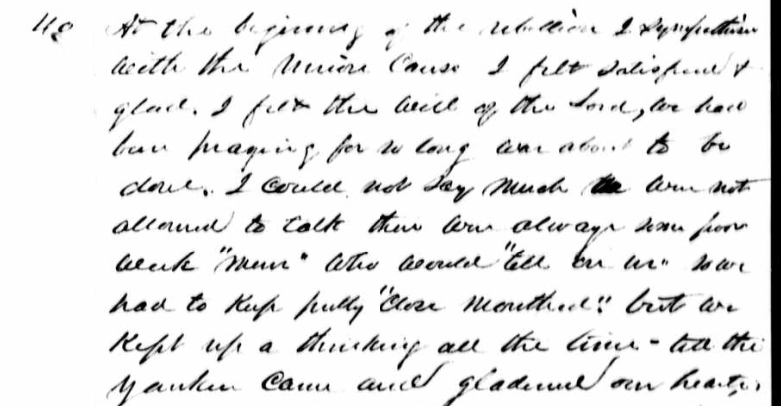
My name is John Way, my age 49 years, my residence Rice Hope, Liberty Co. in the state of Georgia, and my occupation a farmer; I am the claimant and have a beneficial interest in the claim.
Andrew Stacy – Southern Claims Commission
Andrew Stacy, born into slavery in Liberty County, Georgia, around 1838, became free at the end of 1864, when Sherman’s Army arrived. In 1873 Andrew Stacy told the story of that day to the U.S. Southern Claims Commision’s Special Commissioner in support of his claim for compensation for property the soldiers took from him.
Sam Winn – Southern Claims Commission
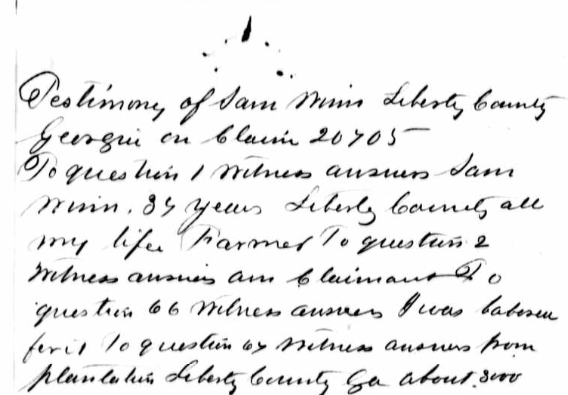
The claimant was a plantation slave during the war. His claim consists of a dozen items and he and two witnesses testify identically to the same number of articles in each item to the same number of pounds, and bushels and to the same value. A [words] and worthless as testimony for it is evident that the two witnesses swear right after the claimant in [two words] and whether he swears from his own knowledge and memory or according to instructions is doubtful. Most of the articles are such as slaves would consume for food and probably belonged to claimant’s owner. We cannot recommend payment of the claim.
Samuel Osgood – Southern Claims Commission
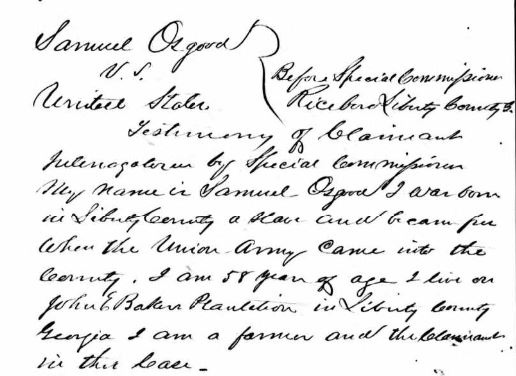
Osgood testified in 1873 that he had been born into slavery in Liberty County, that he was about 58 years old, and that he was still living and farming on John E. Baker’s land, where he had previously been held enslaved. He said he became free when “the Yankees came in and told us we were free.” Before that, he added, “My feelings were if it was the will of the Lord that if our freedom was to come it would be much to my satisfaction. I cast all the influence I had and could give on the side of the Yankees I knew if the war didn’t go on our freedom would not come.”
William Law – Southern Claims Commission
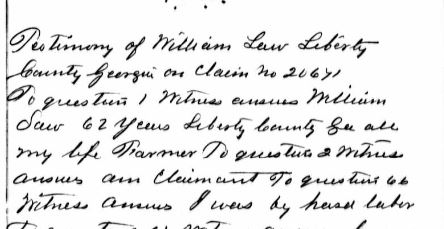
William Law testified in 1877 that he was 62 years old and had lived in Liberty County all his life. He said that R.Q. Baker had been his owner and that he was not testifying for him because he was dead. He claimed to have owned a gray mare, a set of new harness, 4 meat hogs, 15 stock hogs, 12 chickens, plus clothing, bed clothing, lard, pots, and hats, all of which he said were taken by Sherman’s Army while they were foraging in Liberty County in December 1864. His initial 1872 application had said that he would call Caesar Mallard and John Wilson as witnesses, but in 1877 when it came time to testify, he only brought Joseph McDaniel, who testified that he was 41 years old and had also lived in Liberty County all his life. He said he had known William Law from boyhood and that they lived on the same place.
Amy (or Emma) Roberts – Southern Claims Commission
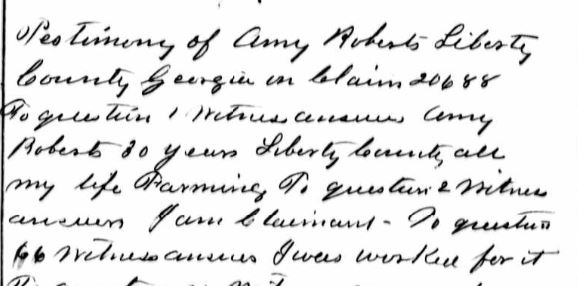
Amy Roberts testified that she was 30 years old in 1877, and her claim was disallowed on the basis that she would only have been about 13 years old when the war started and thus was unlikely to have acquired the relatively large amount of property she claimed: 24 bushels of corn, 6 bushels of peas, 19 bushels of rice, 10 hogs, 75 pounds of pork, 40 head of fowls, plus beds, bedding, and kitchen furniture, which she valued at $188. The property all belonged to her, not to her husband, she said. Amy testified that she was held in slavery by E.B. Way and that she had been married about one year before the war. She said that her husband now lived with her but “was separated by his Master from me during the war.” She added that she had three children: Henry Roberts, not quite 3; Leonora 1 year old; and the other an infant. E.B. Way was not testifying for her because he was dead, she said.
Jack Walker – Southern Claims Commission

In 1879, Jack Walker said that he was then 60 years old, and had lived in Liberty County’s 1132d district for 50 years. He had not mentioned owning property in his testimony for Baggs, but in his own testimony, he stated that he had lost to the soldiers one horse, a saddle and bridle, 20 hogs, 2000 lbs fodder, 150 pounds sugar, 50 bushels of corn, and 50 chickens. This was a large amount of property for an enslaved man, and the Commission denied the claim on the basis that “we do not feel justified in allowing claims for persons formerly slaves without more satisfactory proof that they owned the property than this [claimant] has furnished.” Walker had only testified that he had earned the property by working at nights and weekends, and the Commission normally wanted more detail; not providing it was the fault of the Special Commissioner taking the testimony and Walker’s lawyer, M.J. O’Donoghue.
Caesar and Linda Roberts – Southern Claims Commission
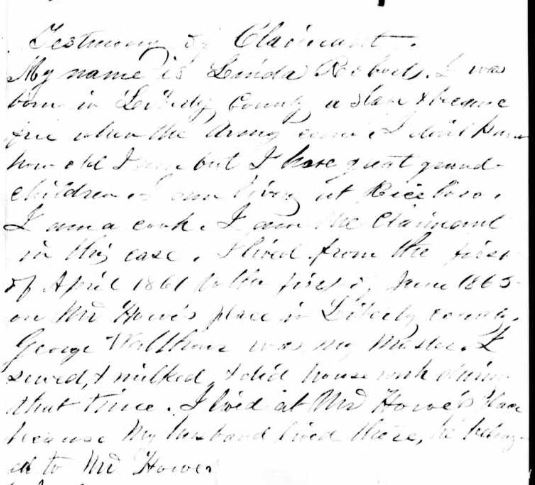
The claimant is an old colored woman – was the slave of George Walthour. “sewed , milked & did housework.” Her husband belonged to Mr. Howe & was a favorite slave & had many privileges & owned some property. He died about three years after the war. That he owned the property claimed is highly improbable. 20 cows would make a good large dairy for a northern farmer; and as her husband “was a driver – did not work in the field but just overlooked” it is not easy to see how he could manage & take care of the 20 cows. The proof of the number is wholly unsatisfactory. She says “he counted them off from the other cattle as they went by” at the time of the raid.
Mingo Quarterman – Southern Claims Commission

Claim Summary Mingo Quarterman’s 1877 Southern Claims Commission petition was denied, but his testimony revealed details about this formerly enslaved man’s life in Liberty County, Georgia. He testified that in 1877 he was 39 years old, and was still living where he had been living when Sherman’s Army came foraging through Liberty County in December […]
Isaac Williams – Southern Claims Commission
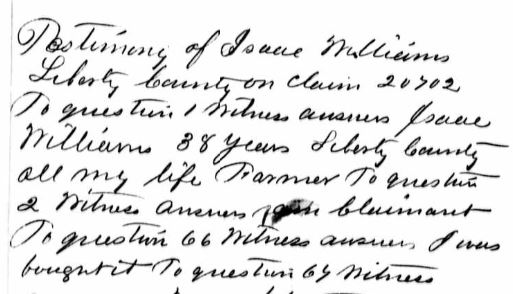
Claim Summary Isaac Williams’ 1877 Southern Claims Commission petition for compensation was rejected. Williams had claimed $320 for a “good bay horse,” 5 cows, and a buggy & harness he said were taken from him by U.S. soldiers from Sherman’s Army when they were foraging in Liberty County, Georgia, in December 1864. The Commission pointed […]